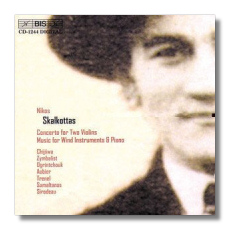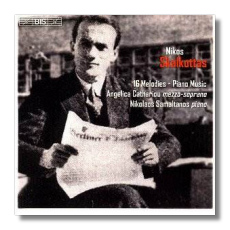
The Internet's Premier Classical Music Source
Related Links
- Latest Reviews
- More Reviews
-
By Composer
-
Collections
DVD & Blu-ray
Books
Concert Reviews
Articles/Interviews
Software
Audio
Search Amazon
Recommended Links
Site News
 CD Review
CD Review
Nikos Skalkottas

Chamber Works
- Concerto for Two Violins and Piano
- Music for Wind Instruments and Piano
- Quartet for Oboe, Trumpet, Bassoon and Piano
- Concertino for Oboe and Piano
- Concertino for Trumpet and Piano
- Tango and Fox-trot for Oboe, Trumpet, Bassoon and Piano
- Sonata Concertante for Bassoon and Piano
Alexeï Ogrintchouk, oboe
Eric Aubier, trumpet
Marc Trenel, bassoon
Eiichi Chijiiwa, violin
Nina Zymbalist, violin
Christophe Sirodeau & Nikolaos Samaltanos, piano
BIS-CD-1244 80 mins


- Sixteen Melodies for mezzo-soprano and piano
- Fifteen Little Variations & Sonatina for piano
- Berceuse & Echo for piano
Angelica Cathariou, mezzo-soprano
Nikolaos Samaltanos, piano
BIS CD-1464 60 mins
Getting to know Nikos Skalkottas' (1904-1949) music has been a long and rewarding pilgrimage. In UK we remain indebted to Lina Lalandi for presenting his music, year after year, in her ground breaking English Bach Festivals, which featured (alongside the eponymous composer) musicians and composers from her native Greece. A high-spot, and it illustrates the difficulty this music presented all those decades ago, was the première of the 3rd piano concerto, which required one pianist for each of its movements, so hard were they to master! There was an early LP box from Greece of chamber music, not all the performances of highest professional standard, but good enough to keep up the interest.
Skalkottas was celebrated as a significant composer in Harry Halbreich's very personal musical Salon des Refusés, a festival in Portugal which focused upon the resurrection of some undeservedly neglected composers of the recent past. The real breakthrough is owed to BIS, which (in characteristic manner) embarked upon a huge recording programme, and has now released some dozen CDs of Skalkottas's music in many genres.
The Concerto for Two Violins "will leave listeners in a contagion of good mood", says Christopher Sirodeau. That sums up my feeling too, and about this whole CD, 80 minutes of close packed music by a composer who tends towards the succinct. The unique concerto for two violins and piano duet (one piano) makes this an imperative must-buy release.
Skalkottas died from a ruptured appendix in 1949, unknown, unpublished, unrecorded and unplayed, before he had orchestrated this double concerto.
This major work has remained unorchestrated by anyone else, but is all the better for that; the richly coloured violin parts and ideas bubbling out with such prolixity make thought of any limitations soon forgotten. Balance problems vanish and the piano score is compelling in its own right. It is enormously invigorating and hear-lifting music, by a composer who brought Mediterranean warmth into rigorous and complex serial procedures he was discovering and elaborating until his untimely death.
The chamber music with wind makes a delightful sequence of varied music, showing that Skalkottas had a rare flair for displaying instruments at their best. Eric Aubier's trumpet is tamed for a domestic environment; Alexeï Ogrintchouk's oboe is suave and mellow, and bassoonist Marc Trenel has a substantial 22 mins work that confirms how few chamber works for their instruments can compete with those of Skalkottas.
The other CD is more for Skalkottas afficionados. The group of piano pieces, mostly early ones, include the delicious and marvellously concise Little Variations. There are also two short pieces which show that Skalkottas (like Schoenberg) was perfectly capable of writing listener-friendly tonal music for Greek audiences who hadn't caught up with modernism.
The 16 songs will never become popular because of the daunting piano parts. They form an important facet of Skalkottas's oeuvre and are put across convincingly by Angelica Cathariou and the ever-astonishing Nikolaos Samaltanos. Presentation is fine, with Greek originals and parallel English translations.
Copyright © 2005, Peter Grahame Woolf


















